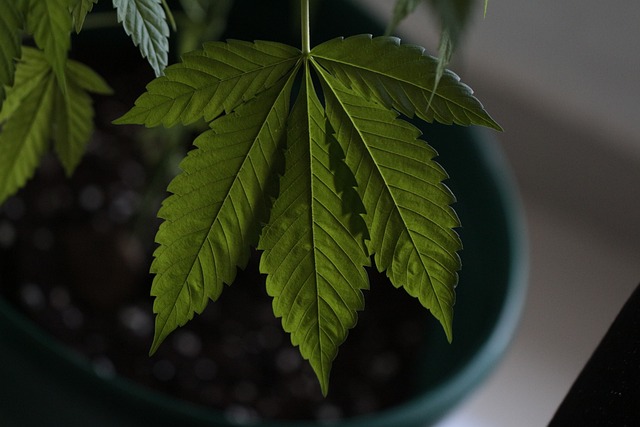The THCA flower, a non-psychoactive form of cannabis rich in therapeutic cannabinoids, is influenced significantly by its unique terpene profiles. These profiles affect the scent, taste, and therapeutic effects, with different terpenes like myrcene and limonene offering varying benefits such as sedative or uplifting properties. Understanding the interaction between terpenes and cannabinoids within the endocannabinoid system is crucial for optimizing health outcomes and minimizing side effects like dry mouth, dizziness, or anxiety. As research evolves, the importance of terpene profiles in THCA flower for health and wellness becomes increasingly evident, with these compounds associated with anti-inflammatory, analgesic, and antispasmodic properties. Users should exercise caution, especially those with sensitive physiology or pre-existing conditions, and start with low doses due to the potential side effects. Consultation with a healthcare professional is recommended before incorporating THCA flower into one's wellness routine, considering its dual potential for health benefits and side effects. It's essential to be aware of the impact of terpene profiles on the effects of THCA flower and to handle it carefully to maintain its efficacy. Consumers should prioritize product testing for safety, seek medical advice if using alongside other medications, and store their THCA flower properly to ensure a positive and responsible experience with its potential therapeutic benefits.
Throughout history, botanical compounds have captivated humanity’s curiosity, offering a myriad of effects and health implications. Today, we delve into the intricacies of THCA (Tetrahydrocannabinolic Acid) flower terpene profiles and their impact on well-being. As we explore the therapeutic potential of this cannabinoid, it’s crucial to understand its side effects. This article sheds light on the spectrum of reactions that can accompany THCA flower use, providing a comprehensive overview. Furthermore, we guide readers through safe consumption practices, including dosage guidelines and potential interactions to consider, ensuring a balanced approach to utilizing THCA flower terpene profiles responsibly. Join us as we navigate this complex landscape of botanical benefits and risks.
- Unraveling the Potency of THCA Flower Terpene Profiles and Their Implications on Health
- Exploring the Spectrum of THCA Flower Side Effects: A Comprehensive Overview
- Navigating Safe Consumption: Dosage, Interactions, and Precautions with THCA Flower
Unraveling the Potency of THCA Flower Terpene Profiles and Their Implications on Health

THCA flower, or tetrahydrocannabinolic acid flower, exists in its raw form before being exposed to heat, which converts it into THC, the psychoactive component of cannabis. The terpene profiles within THCA flower play a pivotal role in its effects and medicinal properties. Terpenes are aromatic compounds found in various plants, including cannabis, that contribute to the plant’s distinctive scents and flavors while also influencing its therapeutic potential. Each strain of THCA flower possesses a unique terpene profile that can affect its efficacy and side effects. For instance, myrcene-rich strains may have sedative effects, while those with limonene might exhibit more invigorating properties. These profiles not only dictate the aroma and taste but also modulate the pharmacokinetics of cannabinoids, potentially enhancing or inhibiting their interactions within the body’s endocannabinoid system.
Investigation into the terpene profiles of THCA flower is a burgeoning field with significant implications for health and wellness. Research indicates that certain terpene combinations may provide anti-inflammatory, analgesic, and antispasmodic effects, making them beneficial for managing pain and inflammation. However, it’s crucial to approach THCA flower with caution, as the side effects can be pronounced and vary depending on individual physiology and specific terpene compositions. Users may experience dry mouth or eyes, dizziness, anxiety, or psychoactive effects if consuming strains high in THC after decarboxylation. Understanding these intricate relationships between terpenes and their potential health benefits or adverse effects is essential for consumers and healthcare professionals alike. As the scientific community continues to unravel the complexities of cannabis and its constituents, the importance of terpene profiles in dictating the therapeutic and side effect profiles of THCA flower becomes increasingly apparent.
Exploring the Spectrum of THCA Flower Side Effects: A Comprehensive Overview

delta-9-tetrahydrocannabinolic acid (THCA) flowers, which are the raw form of cannabis before it is heated to transform into THC, have been gaining attention for their potential therapeutic properties. As interest in the use of THCA flower grows, so does the need to understand its terpene profiles and associated side effects. Terpenes are aromatic compounds found in THCA flowers that contribute to its distinct flavors and fragrances, as well as its unique effects. These terpene profiles can influence the potency and type of side effects experienced by users. While some individuals may benefit from the anti-inflammatory and analgesic properties of THCA without the psychoactive high associated with THC, it is crucial to approach THCA flowers with caution. Potential side effects include dizziness, dry mouth, and altered blood pressure, among others. Users with pre-existing health conditions should be particularly mindful of these side effects, as the interaction between cannabinoids and medications can be complex. It is advisable for users to start with small doses and to consult with a healthcare professional before incorporating THCA flowers into their wellness regimen. Understanding the terpene profiles in THCA flowers is key to predicting and managing its side effects, ensuring a safe and beneficial experience. Users should be aware of individual sensitivities and the potential for both therapeutic and adverse effects when using these products.
Navigating Safe Consumption: Dosage, Interactions, and Precautions with THCA Flower

When considering the safe consumption of THCA flower, it’s crucial to approach it with a clear understanding of dosage, potential interactions, and necessary precautions. THCA, or Tetrahydrocannabinolic Acid, is the raw form of THC found in raw cannabis plants, and its effects can vary significantly from processed forms of THC. Users should start with small doses to gauge their individual sensitivity before gradually increasing consumption if desired. The terpene profiles of THCA flower play a significant role in its effects; specific terpenes like myrcene, limonene, and caryophyllene can influence the psychoactive potency and medicinal properties of the plant. Understanding these terpene interactions is essential for personalized dosing and to minimize any potential adverse effects.
Precautions are equally important when consuming THCA flower. It’s advisable to consult with a healthcare professional before use, especially if you have existing health conditions or are taking other medications. THCA can interact with certain prescription drugs, potentially altering their efficacy or causing unwanted side effects. Additionally, THCA flower should be stored properly to preserve its potency and purity, away from direct light and heat. Regular testing of the product for contaminants like pesticides or heavy metals is recommended to ensure safety and quality. By adhering to these guidelines and paying attention to the unique terpene profiles of different THCA flowers, consumers can navigate the experience with informed caution and enhance their well-being responsibly.
In conclusion, the exploration of THCA flower terpene profiles has revealed a complex interplay between these compounds and human health, highlighting both the potential benefits and the spectrum of side effects associated with its consumption. It is clear that understanding dosage, interactions, and maintaining safe consumption practices are paramount when engaging with THCA flower. As research continues to evolve in this emerging field, it is essential for consumers to be well-informed and cautious, ensuring they consult with healthcare professionals before incorporating THCA flower into their wellness routines. The implications of THCA flower terpene profiles on individual health outcomes are significant, and a prudent approach will best guide users towards making informed decisions about its use.


